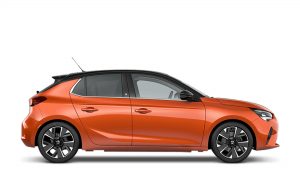The only time-passing diversion at Milton Keynes station at midnight yesterday, as I waited to pick up a very late family member, was a series of rolling electronic adverts. The display had the desired effect, because here I am imparting the case for the all-electric Vauxhall Corsa-e – “Milton Keynes to West Yorkshire on a single charge” was the promise.
As successful a car-maker as Vauxhall may have been, if you asked people just a few years ago which manufacturer they would expect to be among the last to produce an electric vehicle (EV), I suspect Vauxhall would have been high on their list.
(That derogatory assumption is misplaced, I now find. The venerable car maker, which served the British middle-market’s taste for staid and steady vehicles from Luton in Bedfordshire for many years, is now owned by French company PSA. Vauxhall survives merely as a marketing name. The Corsa-e is actually produced by Opel, in Zaragoza in Spain.)
Yet almost 10 years on from the first all-electric car, the Nissan Leaf (launched in May 2010), it’s a mark of how mainstream the concept has become that the very notion of an electric Vauxhall, whoever is making it, now feels perfectly normal.
The Corsa-e, despite joining the EV revolution late, will have the advantage of longer range – about 330 km (205 miles) – over what are likely to be Its main competitors, the well-established Nissan Leaf and the Renault Zoe. (Those figures are always optimistic for the regular driver, of course. Running the air conditioning and heating can cut deeply into range.) A fast charge, up to 80%, takes 30 minutes.
One reviewer described it as “a fully electric hatchback that looks just like its petrol-powered base car”. That might reassure anyone who is put off EVs because they look a little “odd”. “For people who like buying badges they know from dealers around the corner, that could be enough to garner rather a lot of sales.” Which might be another way of saying this is the car for the non-EV revolutionary.
“You won’t be buying this one to make a visual statement, but perhaps that’s its appeal; electric power without making a song and dance about it.”
A full charge on a three-pin socket at home will take around 24 hours. Vauxhall is adding in a wall-mounted fast charger and installation at your home, which cuts a full charge to 7.5 hours. By means of an app, users can plug the car in but instruct it to only draw charge from the grid when electricity rates are lowest.
Prices start at £27,165 with the government’s current EV grant applied.

